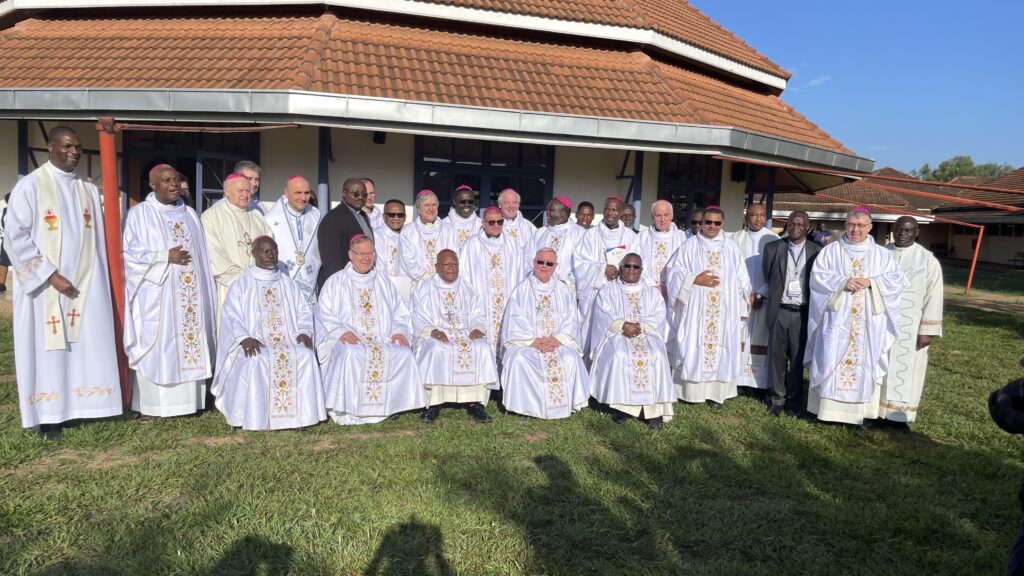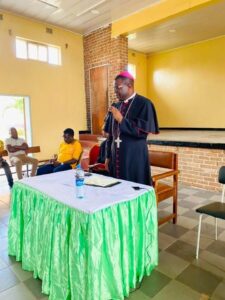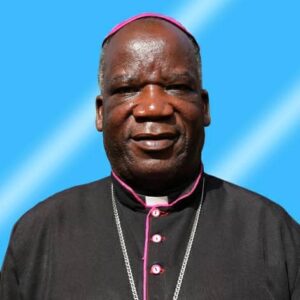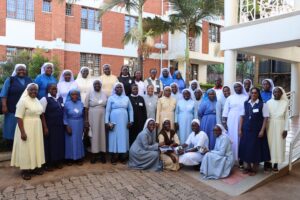SECAM: After Decades of Fraternal Relationship, Synod Inspires African and European Bishops to Preserve Unity in Diversity

Sr. Jecinter Antoinette Okoth, FSSA
Members of the Symposium of Episcopal Conferences of Africa and Madagascar (SECAM) and the Council of European Catholic Bishops’ Conferences (CCEE) whose collaboration has existed for the last 20 years, feel more inspired by the spirit of the ongoing synod to preserve unity in diverse, SECAM official has said.
Addressing the representative Bishops from the two continental bodies while attending a two-day seminar in Nairobi, Kenya, SECAM President Fridolin Cardinal Ambongo Besungu expressed that the collaboration which synod on synodality promotes, helps lessen the dangers of centralism.
“In our collaborative journey, the synodal process inspires us, particularly as Continental Organizations, to preserve the faith and culture of diverse peoples. This approach is essential to mitigate the risks of uniformity and centralism, as highlighted in Chapter 19, section (d) of the Synthesis of the First Session of the Synod on Synodality,” Cardinal Ambongo of Kinshasa Archdiocese in the Democratic Republic of the Congo (DRC), said in his opening speech Wednesday, January 24.
He narrated that the commemoration of the two decades of fraternal relationship since the initiation of the bond between the two continental bodies, the seventh seminar in Nairobi also serves as a moment for introspection and review.
“Our goal is to boldly relinquish any practices or approaches that hinder our collective progress,” Cardinal Ambongo said and continued, “We will adopt strategies and principles that strengthen our collaboration and communion in the mission of spreading the Gospel of salvation and fostering the growth of Christ’s Church on our continents.”
The Cardinal who has been at the helm of SECAM for nearly a year after the death of His Eminence Richard Kuuia Cardinal Baawobr, urged participants to allow the Spirit guide their discussions and come up with renewed strategies for evangelization.
“At the school of synodality, we want to express our desire to be guided by the Spirit of Jesus, listening to each other with attention and respect, and drawing inspiration from our sharing and discussions for a renewed apostolate in view of a profound evangelization and re-evangelization of our continents,” the Cardinal said.
Themed ‘Synodality: Africa and Europe walking together’, the seminar aimed to engage in thoughtful reflection on how to genuinely walk together in a spirit of communion, collaboration, and mutual respect. The theme also gains fresh impetus and relevance in light of the current dynamics of synodality that the Church is experiencing.
According to Cardinal Ambongo in his opening speech, the collaboration between African and European Bishops, which begun in 2004 with the first symposium in Rome under the theme; “Communion and Solidarity between Africa and Europe,” was highly supported by Vatican departments, including the Congregation for the Evangelization of Peoples, the Synod of Bishops, and the Pontifical Council Cor Unum.
“The first objective was to foster a sense of communion among African and European Bishops, grounded in their sacramental brotherhood,” the member of the Order of Friar Minor Capuchin (OFM Cap) said and narrated further, “The second objective focused on engaging in discussions about shared responsibilities in evangelization, mission, and pastoral care, particularly in the context of a globalized world and the emerging challenges posed by secularization.”
Since then, the two continental bodies have held other seminars in Cape Coast, Ghana, in 2007, focusing on the theme of new forms of slavery, in Liverpool, England, in 2008, which delved into the theme of migration, later in Abidjan, Ivory Coast, in 2010, concentrating on the theme of African pastoral agents in Europe.
In 2012, the bishops met again in Rome, Italy, and focused on evangelization, and in 2015 the seminar took place in Maputo, Mozambique, 2015, under the theme of the Family, after which the sixth seminar was held in Fatima, Portugal, in 2018, exploring the theme of Globalization.
Prior to the seventh seminar for the bishops, Cardinal Ambongo had issued a statement on behalf of the African bishops in response to the Vatican’s “Fiducia Supplicans” declaration dated December 18, 2023, on the pastoral meaning of blessing.
He recounted his message during the opening session of the seminar in Nairobi saying, “Within this framework, I addressed the people of God in Africa, summarizing the responses of the Episcopal Conferences of Africa and Madagascar to the “Fiducia Supplicans” declaration published by the Dicastery for Doctrine and Faith.”
In my message, the Cardinal continued, “The Episcopal Conferences across Africa, which have strongly reaffirmed their communion with Pope Francis, believe that the extra-liturgical blessings proposed in the Declaration Fiducia supplicans cannot be carried out in Africa without exposing themselves to scandals. They remind, as Fiducia Supplicans clearly do, the clergy, religious communities, all believers, and people of good will, that the Church’s doctrine on Christian marriage and sexuality remains unchanged.”
For this reason, he said further, “We, the African Bishops, do not consider it appropriate for Africa to bless homosexual unions or same-sex couples because, in our context, this would cause confusion and would be in direct contradiction to the cultural ethos of African communities. The language of Fiducia supplicans remains too subtle for simple people to understand.”
The bishops, among other topics, discussed the understanding of the emerging synodal Church in the light of Praedicate Evangelium, the continental impression on the first session of Synod on Synodality and how the Church can listen to young people in Africa and Europe in the light of the synodal process.


